The quintessential American novel

Each month, I allow myself to purchase one current "best selling" or "most talked about" book. A book-of-the-moment, if you will. Sometimes I read them right away, other times if I think the hype has just gotten too big, I'll set them aside for later because nothing kills a book for me quicker than too much hype (I'm bound to be disappointed). But just enough people we're talking about Anne Tyler's new book A Spool of New Thread to catch my attention and it wasn't too much attention....perfect. Add to this the not insignificant fact that - gasp - I had not yet read a Tyler novel. What a gap in my literary career.
I chose the audio version out of sheer convenience (an Audible credit was begging to be used and it was a nice narration change to hear a good strong American accent - a rarity these days). Tyler's story about three generations - although not necessarily told in a linear fashion - of an American family in Baltimore had me hooked from the very first paragraph and held me riveted throughout.
The Whitshanks are nothing remarkable from the outside. They are your standard American family. The family dynamics within are nothing remarkable either. But it's Tyler's telling of the story as she reveals layers of each generation that proves how little we all know about our own nearest and dearest that is so remarkable. We all think we know everything about our closest family members...Tyler shows us that no, really we do not. She does so in such an understated, fact-of-the-matter way that I simply fell in love with her right then and there. And promptly went and purchased every other book she has ever written (my huge Amazon box full of them arrived yesterday). I now have little trouble imagining how she won her Pulitzer.
I didn't necessarily fall in love with the Whitshank family, but I don't think that was Tyler's intention. I enjoyed my time with them and I enjoyed what Tyler revealed to me about them. I listed to the story every spare moment I had (something I don't normally do with audiobooks). What I walked away thinking after the novel was finished was that this was truly an American story, without any false notes or patriotism thrown in...nothing so obvious like that. It was straightforward and deft in the telling. There was nothing I did not like. Highly recommended.
 2
2
2015 Book Resolution #1
I Hereby Refuse to Read ANY Novel That Has a Blurb Comparing it to GONE GIRL.
publishers take note please. (i didn't like the original for crying out loud, quit bombarding me with fake ones too.)
thank you.
carry on.....
Secrets worth hiding....
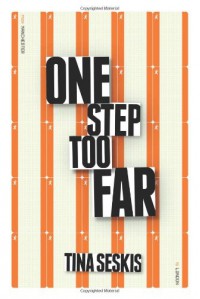
The secrets women carry and the lengths they will go to in order to preserve those secrets are hot in genre fiction right now. Done well, these novels can be utterly compelling and difficult to put down as our inner voyeur rushes to discover the big reveal and pass judgement on the protagonist. Done poorly and the novel is an exercise in frustration and one giant eye-roll.
After reading an unfortunate spate of less than stellar novels in this genre lately, I found Seskis’ effort a refreshing change: One Step Too Far was well plotted, the scenario plausible, and the characters quite empathetic all around. This is how a well-done book in the genre *should* read.
Seskis’ story caught my attention from the first chapter with her introduction of a wife and mother running away from her family. We don’t know why she is running, but I was immediately interested. The story shifts with each chapter. One chapter might fall back to her childhood, revealing something relevant. The next chapter might bounce back to present day as she creates her new identity. The next shifts back to her wedding day. And so on. Something is revealed each time, but not enough to figure out the big picture. The tension just increases until everything explodes and, of course, we finally find out why she ran away. And the fall-out in everyone’s lives that comes after.
The entire novel had a tightly-plotted feel to it and I couldn’t find any loose ends lying about, something I’ve developed an appreciation for. This is an author to watch. She originally published this novel and another herself before Harper saw the sales potential and grabbed them. I expect to see more from her and suspect as her style matures, the novels will get even better. Recommended.
 1
1
Flavia de Luce is Growing Up

Flavia de Luce #7. For those who have been faithfully following the Flavia de Luce series, we knew As Chimney Sweepers Come to Dust was going to be a major turning point for our intrepid young heroine. Bradley's last novel left us with the tantalizing knowledge that Flavia was being shipped off to a rather unusual boarding school in Canada.
And so this novel begins and the entire thing must have been a challenge for Bradley given that most of the characters that have populated Flavia's life (and the novels) up until this point in the series were not present in this story, making for a very isolated and unnerving atmosphere, both for the reader and Flavia herself.
There is, of course, a corpse. But while previous novels have focused entirely on Flavia's solving the mystery of how that corpse became a corpse, this novel devoted just as much story line to the mystery of Flavia's new boarding school and it's mysterious occupants. While the corpse and the boarding school mystery do, eventually, dovetail together it did make for some disjointed reading at times.
Those who read the Flavia novels purely for the enjoyment of the setting of Buckshaw are likely to be thrown a little off kilter by this novel, but I think you ought to give it it's due. Because - and this is important - Bradley give us his now-signature Huge-Twist-We-Didn't-See-Coming at the end. Honestly, he is one of the only authors who is ever able to surprise me. And I was, admittedly, enormously pleased with his twist in this one....so don't miss it if you read the series.
The bottom line is that Flavia is growing up. We all knew it had to happen. The question has always been how Bradley was going to handle it. In my opinion, he's doing quite well indeed.
 1
1
As you know, Bob....
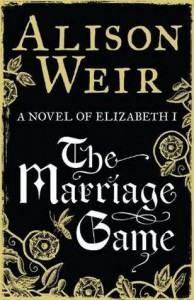
Although I've never cared for Weir's historical work (well researched but too biased in my opinion), I did very much like the first historical fiction novel she wrote. This, I felt, was her true calling. It allowed her to put her meticulous research to use and at the same time employ all the bias she wanted -- it was, after all, fiction. Have fun with it, I felt. And the result was fabulous.
Not so much for her follow up novel and most certainly not for this novel, The Marriage Game. The research, I must say, is still there. The technical writing of the novel is just...just...oh dear. The problems began for me as early as the third page where we find Elizabeth, soon after the death of her sister Queen Mary I, mentally going over how she plans to run her newly inherited kingdom. Her thoughts are quick to tell us that she will not make windows into men's souls (regarding the question of religion in her realm). Now. Everyone who knows anything about Elizabeth knows this is one of her most famous quotes. We've all read it. It's included in every biography and every work of fiction ever written about her. It's become an over-used trope. Was it really necessary to use it *word for word* in the stinking first chapter?
But it was just a sentence so I moved right along. Elizabeth, frankly, is portrayed as a conniving bitch in this book. And this part, I loved. It was a bit refreshing and was what saved the book from a two-star review. Because when you think about it, given her childhood and the environment in which she had to struggle to keep her throne, the woman wouldn't have lasted two seconds if she had been a trusting, loving Polly-Anna. Unfortunately, Weir doesn't go much beyond the bitchy part. The entire plot of the book consists of Elizabeth's yearning for Robert Dudley and dancing around the various marriage proposals that come her way throughout her reign. Angst over Dudley, marriage proposal, weasel out of it, repeat. For 400 pages.
Even that I could have forgiven were it not for the dreaded "As you know, Bob" syndrome that pervades nearly every bit of dialog throughout the book. This syndrome will drive you batty once you notice it. It happens when an author wants to fill the reader in on backstory via dialog, but it comes across at utterly stupid when you realize it's information that the characters would already know. So, for example (and I'm not going to quote from the text because the book is an advance copy and the publishers don't want you to quote from it until publishing date, so I'll just make up an example and tell you this is EXACTLY the kind of thing that goes on throughout this book):
King Larry to his wife, the Queen: "Well, as you may remember my dear, my father King Joseph the Third who ruled this kingdom for thirty years died last year of consumption and the entire kingdom was in mourning."
She's his wife. Of course she remembers, you idiot. She knows who your father was, so you don't need to use his full name and title, I'm pretty sure she would know what he died of, and she probably would be perfectly aware the entire kingdom was in mourning. It just sounds stupid. Gah!
The Marriage Game is full of this kind of "as you know" dialog between characters that is frustrating because *of course* the other character knows this and it's meant to inform you, the reader, but comes across and utterly unbelievable and eye-roll inducing. There are better ways to get the back-story to readers (although admittedly, it's a fine line because no one likes an info-dump either. That's why writing historical fiction is hard!).
So what we have here is yet another entry of Elizabeth I fiction into the already saturated Tudor market. It's hard to recommend it. For those of you who still have an interest in this time period and aren't completely burned out yet, I do still recommend Elizabeth Fremantle's two novels (her debut last year and another release this year in 2014) as very good entries in the field and suggest you track those down. If you really want to give this one a try, I'd suggest it as a library checkout.
 1
1
Based on a true story, you absolutely need to read this
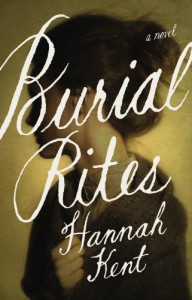
As if the subject matter wasn't fascinating enough - based on the true story of the last woman to be executed in Iceland - Hannah Kent's true talent in her novel Burial Rites lies in evoking time and place. Set in the desolate far north of Iceland in 1829, what *really* happened to accused murderess Agnes Magnusdottir on the night her employer/lover was killed and then burned in his home is slowly revealed over the course of the novel. And of course the novel is about Agnes herself - her origins, her upbringing, her life.
The novel masterfully switches between past and present day, where Agnes is being held in a local family's home awaiting execution. She is not welcome there. Throughout the months it takes for the execution details to become finalized, we learn just as much about Agnes through the eyes of this family as we do from the trips to the past.
It isn't until you finish reading the novel and think about these details that you realize what made this such an amazing novel: it was the proficiency with which Kent writes. Her nearly imperceptible transitions between third and first person points of view are seamless and perfectly placed, not clunky or obvious as in so many many other novels. Her use of dialog is very deliberate and no character is ever speaking just to take up word space: every sentence has a purpose.
And best of all...her evocation of time and place. I was nearly speechless over this. A reader can almost always get an idea of setting when reading a novel, but rarely are you *transported* to that setting. Kent transports you. You can just about feel the cold, smell the smoke from the fires...it is that well-done, but without taking pages and pages to do so.
What more can I say, but read this. I rarely go with "the herd" when it comes to popular books, but this one truly deserves each of it's high ratings.
 2
2
Can we just saint J.K. Rowling and get it over with?

In her second outing under the pseudonym Robert Galbraith, author J.K. Rowling is back with her erstwhile noir private dick Cormoran Strike and a whole new mystery in the recently released Silkworm. And dare I say it? Rowling is getting better and better with each installment.
But writers are a savage breed, Mr. Strike. If you want lifelong friendship and selfless camaraderie, join the army and learn to kill. If you want a lifetime of temporary alliances with peers who will glory in your every failure, write novels.
"Hard to remember these days that there was a time when you had to wait for the ink and paper reviews to see your work excoriated. With the invention of the internet, any sub-literate cretin can be Michiko Kakutani."
A Fresh Tudor Voice in a Sea of Tudor Overload
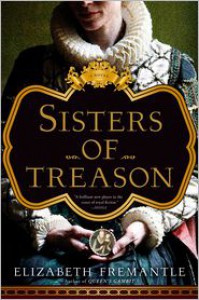
If you happened to catch author Liz Fremantle's debut effort last year (Queen's Gambit) then you likely already know why historical fiction fans were thrilled to welcome her fresh voice into the genre. Sharp, witty, and full of ironic observations, Fremantle proved she was most assuredly a far cut above the standard, ho-hum historical fiction fare usually bogging down the bookstore shelves today.
So her when her follow up effort, SISTERS OF TREASON, recently arrived in stores, it generated buzz. Sisters of Treason returns to the Tudor era, a period one might legitimately question whether there was anything left worth writing about following the excruciating Tudor-mania that swept the genre over the past decade. Once again, Fremantle is full of delightful surprise. She alights upon the tragic Grey sisters.
Refresher: On July 10, 1553, following the death of England's young and sickly King Edward VI (the only son of Henry VIII), a teenaged Lady Jane Grey was unwittingly raised to the throne via the machinations of her father and father-in-law in an ill-advised power grab. It didn't work out too well. Henry VIII's eldest daughter Mary promptly marched into London, deposed her young cousin Jane, and later lopped off her head. Mary would become known to history as Bloody Mary for her tendency to burn those who didn't toe her Catholic line. End refresher.
So that was the end of poor Jane Grey and many historical fiction novels have been written this tragic figure who lost her head piously clutching her Protestant Bible to the very end. And yet.....did you know that our sweet Jane happened to have two younger sisters? And if you're analytic mind is fast at work, it's already figured out that if tragic Jane Grey had a legitimate claim to the throne of merry ol' England, so too did her younger sisters Katherine and Mary Grey. And this is the fascinating Tudor story that cunning Fremantle presents in Sisters of Treason.
Welcome to a most un-glamorous royal court. Mary reigns with a paranoid suspicious eye trained directly on the two sisters Jane Grey left behind. Keeping her friends close but her enemies closer, the sisters are kept in the Queen's court where the smallest misstep or misinterpretation of a word meant treason. As the years of Mary's reign continued, her suspicions grew with her along with her failed marriage and lack of a royal heir ("...royal blood and a functioning womb is all most care about in a princess"). The Grey sister's relationship with Mary's successor, the legendary Queen Elizabeth I, fared little better.
Fremantle chooses to tell the sister's tale using three viewpoints: Katherine, Mary, and a female court painter, Levina Teerlinc (an interesting choice given that historically, little is known about this fascinating woman other than she is known to have painted a surviving portrait of Katherine Grey) who acts as a surrogate mother to the girls at court. Paying strict homage to historical documents and making interpretations only where she is free to do so, Fremantle presents a vivid portrait of two sisters with Tudor blood running through their veins only to spend their entire life being horribly punished for it.
Ultimately, both Katherine and Mary lived short, unhappy lives, making this well-written story something of a tragedy. Fremantle admirably tries to discover moments of joy they might found in an otherwise bleak existence through no fault of their own, but the reality is that both girls only lived long enough to become women who never experienced a normal life: the events that populate or mark a normal woman's life were - for both of the Grey sisters - so marred with hatred from the reigning Queen that any experience of normal happiness would have proved impossible. In an era when noble birth was the only way a person might experience comfort or luxury, the Grey sisters, I suspect, might have happily traded places with the lowliest of servants in the castle.
Well-written, well-researched historical fiction. Recommended for historical fiction aficionados.
A titillating glimpse into someone else's tragedy that falls just short of the mark

Secrets. It’s a popular theme in fiction these days. Keeping secrets as well as the havoc and damage secrets can lead to offer an author a multitude of plot avenues to explore. You Should Have Known, the latest novel by veteran author Jean Hanff Korelitz, takes a slightly different tact by focusing on the victim of family secrets rather that the perpetrator.
Family therapist Grace Sachs has it all: a successful career, a talented son, a husband at the pinnacle of his medical career, and even her first book set for publication entitled You Should Have Known. Interviews, television appearances - it seems everyone is fascinated by Grace’s unique take on marriage counseling. As Grace declares, no one should be surprised when your marriage disintegrates. After all, the signs were all there before you chose to marry. If you chose to ignore them, it was at your own peril. A cheating spouse? A wife with a gambling addiction? An alcoholic, abusive husband? The signs were all there….you should have known.
Grace’s theories, however, soon get put to the test when her own husband’s secrets are publicly - oh how publicly! - revealed, decimating Grace’s marriage, her career, and her public persona. The question quickly becomes: Should Grace have known?
Korelitz walks a fine line throughout the novel with Grace. It is a generally accepted axiom that a protagonist, regardless of faults, should still be sympathetic to the reader. Grace’s hubris makes this a difficult task at times and while Korelitz tries to offset this by elevating her husband’s crimes beyond any and all acceptable lines, she doesn’t always succeed. The narrative is provided by Grace, giving ample opportunity for long introspective monologues throughout the story. Grace’s general refusal to contemplate her own behavior that enabled her husband to commit such an atrocity starts to wear thin after the first 200 pages.
Throughout most of the novel, Grace seems nothing more than a passive, bewildered observer to her own crisis. If the novel took place over the course of a few days this particular trait might be more understandable - ergo, sympathetic - to the reader. Instead, as the weeks and months pass, it verges on the cusp of annoying. Grace simply allows events to happen to her with little reaction aside from perpetually stunned.
Her husband’s crimes - a thread of the story that promises rapt reader attention - become of less and less importance and ultimately find no resolution by the end. This loose end may well have been a deliberate tactic by Korelitz to indicate the relative unimportance his actions - the novel is, after all, about Grace and her self-discovery - but ends up feeling like an untidy detail forgotten in the need to wrap the story up.
For the reader who can overlook this or find some overriding sympathetic qualities in Grace, the story does have many redeeming qualities. Korelitz excels creating the upper-middle-class, New York City environment that encloses Grace and her family. The continual one upmanship that exists amongst New York mothers jockeying for the best private schools, tutors, and exclusive activities for their children is a thought-provoking indictment of societal values. Put another way: Manhattanites take PTA politics to an entirely new level.
Woven in with this is the theme of friendship and the superficiality of many everyday relationships. Grace’s tendency to keep herself at arms-length from those outside her own nuclear family. Ultimately, she suffers from this decision and finds herself with no support system and a son she thinks she is protecting from the real world.
Although the plot of You Should Have Known is compelling enough to keep turning the pages, weak resolutions and questions about Grace’s character linger for me. Whether you experience sympathy or frustration will likely depend on your own judgement of Grace - an irony considering judgment of others is one of Grace’s great flaws.
The Road to Rapture

While a cross-country family road-trip is the stuff of nightmares for most teenagers, Jess Metcalf has more reasons for dread than any other teen: her religious fanatic father, her spineless mother, and her secretly-pregnant older sister are traveling to California where their father hopes to be for the impending (impending as in just a few days) Rapture he is convinced is upon them.
The journey, of course, is the story. Told from Jess' perspective - one very caustic and witty narrator if ever there was one - Miller pulls out all the stops here, wrestling with religion (Jess is doubtful at best), parental authority (the faster the Rapture approaches the less Jess respects this), with serious undertones of abuse (which comes in many forms) throughout the entire novel. In addition to all of this, we have Jess' own teen angst: body issues, lack of friends, losing her virginity. Heavy stuff.
And while the narrative is indeed witty and at times insightful, the powerful themes at work here are never examined too closely. Jess' father is an excellent example. Clearly presented as a hypocritical religious fundamentalist, he is in every way a despicable human being throughout the novel. Spouting Bible verses while stopping at casinos on the way to gamble, his family engagement is superficial at best given that he ignores his daughters, bullies his wife, has lost his job and can not even provide for his brood. Yet his character - and the damage he has done to his family - never quite emerges from this two dimensional caricature. Likewise for other family members.
I did enjoy some laugh-out-loud moments in the book, as well as some good insightful moments for Jess, but I wish this coming of age tale could have tackled fewer issues with greater depth. Perhaps then the entire book would have had more meaning.

 1
1
How I do love imported books....

First book for Bout of Books 10.0 Readathon. The Murder Farm by Andrea Maria Schenkel. (Random House. June 3, 2014)
First published in Germany to critical acclaim in 2009, The Murder Farm is a crime novel of a multiple murder taking place at a remote Austrian farmhouse in the years following WWII. The stark, bleak - and highly effective - narrative is told from multiple points of view in the form of interviews of the local residents who knew the victims.
For a short novel (only 125 pages), The Murder Farm packs quite a punch. The interviews slowly reveal the victims to be harboring distasteful secrets of their own. And while the story is loosely based on a real-life unsolved case, Schenkel offers up a nice solution to this one.
Read it less for the mystery and more to see how a talented author presents the subjects matter. Kudos to Quercus for bringing it to the U.S.
 1
1
Oh dear....
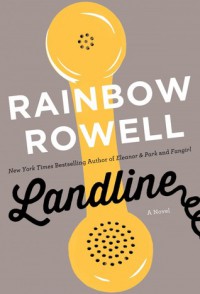
I am going to admit - up front - that I am a huge, huge Rainbow Rowell fan. I have adored every word this woman has written and have often said that I'd give her grocery list 5 stars. So it probably goes without saying that I was thrilled to get my mitts on an early copy of her new book LANDLINE. I've been looking forward to this for months and dropped every other book I was reading the moment I tore open the envelope.
It was, therefore, a rather shocking and horrible moment when, as I turned the final page of the book, I finally had to admit to myself that I did not care for this story at all. In fact, I vacillated for a while between not caring for the story and actively disliking the story....I finally decided to error on the side of caution and go with not caring for it.
What on earth could have caused me to give a Rainbow Rowell novel three stars? On the surface, we have a good little story: Georgie McCool is a working married mother of two whose fourteen year marriage to Neal is going through a bit of a rough spot, as all marriages do from time to time. As a television script writer and sole provider for her family, Georgie works a lot of long hours and this has put some pressure on her marriage. But when the opportunity she has been working her entire career for - a shot at writing her own show - comes up, Georgie will need to work over Christmas and miss the annual family trip to her in-laws house in Nebraska. And her husband, Neal, is most assuredly not happy about this.
So Neal agrees to take the family to Nebraska without her. Apparently, though, he doesn't mention to Georgie that he might - or might not - be permanently leaving her. It's hard to tell. Because he won't answer his phone or talk to her.
At this point some magical realism enters the story in the form of an old yellow rotary phone, etc and so on (no spoilers here) and Georgie has some decisions to make.
So - back to my three stars. I'm fully aware that LANDLINE is not Rowell's typical YA fare. It is, in fact, an adult novel. That said, I also think it's a given that millions of her YA fans will still flock to this book and I am very disturbed by the message Georgie and her marriage send to these young women readers. Neal's actions throughout the novel are tantamount to emotional blackmail. He is an unhappy man - clearly unhappy before he and Georgie even married - who demands his wife *make* him happy. Her constant subservience to his emotional blackmail sends an uncomfortable message (says this reviewer married 11 years now).
While it is ultimately Rowell's story and her prerogative to take the story wherever she wants to go, I was so uncomfortable it that her usual cast of charming secondary characters, etc, wasn't enough to overcome this problem for me. In any event, your reaction is going to depend on your own personal opinions/experiences. So of course, you might well have a much better experience with LANDLINE than I did so I very much encourage you to read other reviews before making your purchase decision.
Have We Forgotten How to Read?
A recent article in the Washington Post featured the recent research of a cognitive neuroscientist which suggests that the current superficial ways in which we read - largely via electronic media such as the internet, email, e-readers, news scrollers on the television - is actually changing the way our brains process reading. And not in a good way.
In fact, claims Maryanne Wolf, a Tufts University neuroscientist and author of “Proust and the Squid: The Story and Science of the Reading Brain,” it might well be that our brains are actually forgetting how to read and comprehend in the traditional, linear manner. As evidence, the article offers a plethora of personal anecdotes from various researchers and university professors who claim that the Internet is churning out new generations of students unable to read classic literature.
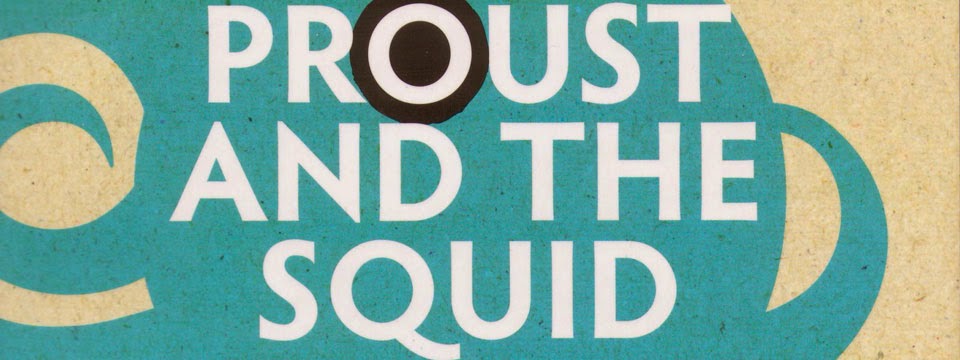
At first glance, what Wolf and other researchers were suggesting made sense. We are a society dominated by sound bites. We skim for what we need in an overwhelming sea of information. We read just enough to get what we need and then click on the link that takes us where we need to go, then skim some more. In a world where evolution is the name of the game, I could almost buy the premise that our reading brain would adapt to this change. Almost. Not quite.
You see, I am a part of that unique generation that straddled the advent of the Internet. My primary education and early university years were largely Internet-free. Our brains, if you will, were as yet untainted by bits and bytes. And I’m not embarrassed to admit that neither I, nor the vast majority of my freshman American Lit class, could intelligently pick out a single theme of Melville’s Moby Dick. Sorry, professor. Sometimes a whale is just a whale. Get over it.

Back in the early 1990s, of course, the Internet wasn’t ubiquitous enough to blame for a student’s inability to read and regurgitate Nathanial Hawthorne or Henry James. Most professors simply blamed Harry Potter. Blaming outside culture, I’ve found, has always been easier than facing the obvious answer: very few of our students were ever taught how to properly read and analyze literature. No one ever bothered.
If we were very lucky this inability to properly read and analyze literature didn’t deter us from a love of books. This is an amazing thing when you think about it. To find wisdom, escape, life lessons, and comfort within the pages of a book despite not knowing how to properly analyze and digest what we are reading. This is visceral. This the human thirst for knowledge, understanding, and connection at it’s most basic level. And it is beautiful.
We now live in the age of the Internet. Fast news, short articles, links to any information your curiosity desires await your typing fingers. I, for one, am not afraid to proclaim that this Age of the Internet has in no way proven detrimental to our ability to read and comprehend books. If anything, it has improved it. Quick knowledge is at our fingertips, just a Google search away. Did your English professor fail to teach you different ways to analyze literature? A quick internet search turns up dozens of tutorials highlighting dozens of methods. Pick the one you like best. If you feel particularly slighted by a sub-par education you can even enroll in an Ivy League literature class online. For free. Those who desire something less structured can find thousands of online book clubs that provide opportunities to read and discuss classic literature. There is, as the saying goes, a butt for every saddle.
If history is any indication, technological advances have always been a dire threat to books. It’s been nearly 80 years since Abbott and Costello over the airwaves posed an obvious threat to Middlemarch and The Scarlet Letter. When radio failed to destroy books, the television was brought to bear and millions of young minds were forcibly turned away from King Lear and Great Expectations by Ed Sullivan parading the gyrating hips of Elvis for all to see. The clear evil we face today, if we are to believe the red flag wavers, is the Internet and all its insidious by-products, including email, Facebook, Twitter, YouTube, and probably even NPR online. And don’t forget the slow removal of your brain’s ability to read a book. War and Peace may never be read again.
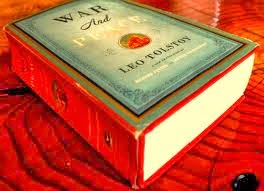
Another novella for Outlander people....

This Outlander novella tracks the story of Joan McKimmie (Jamie Fraser's stepdaughter by Laoghaire) when she leaves Scotland for France under the protection of Michael Murray (Ian Murray's elder brother who has a wine business in Paris) to become a nun. Those who read Gabaldon's novel Echo in the Bone will recall the two leaving on this journey.
The Space Between is a bit over a 100 pages and featured in the anthology "The Mad Scientist's Guide to World Domination" for those who wish to read it.
As is normal for Gabaldon these days (in my opinion), she writes far, far better when she gets away from Jamie and Claire. Joan is a fascinating character - we learn that she has more of the 'sight' than she's comfortable with, suffering with the ability to hear voices (shades of Joan of Arc) and see what can only be described as death auras -- shades that envelope people who are about to die soon. Joan's reasons for wanting to enter a convent aren't as pious as we perhaps thought in An Echo in the Bone.
For Michael's part, he is still mourning the death of his father, his young wife and their unborn child. When he and Joan accidentally tangle with another Outlander 'blast from the past' - the Comte St. Germain, things start to get very dangerous for both of them.
The Space Between is contains more information about time travel, for those who are interested in that aspect of the Outlander books, as well. All in all, it is a good novella - not astounding, but good - that brings back a couple of characters from earlier books for those of you with good memories. Personally, I enjoy Gabaldon's writing when she *isn't* writing about Jamie and Claire so this was a good read for me.
The Prequel from Hell

Prequel novella to upcoming novel "Dorothy Must Die." Dorothy's return to Oz. I was, admittedly, disappointed. While I thought the concept was delightfully unique (I purchased this prequel in anticipation of the upcoming novel), I found the execution to be extremely simplistic. Of course, it *is* a Young Adult novella - as is the upcoming novel - and that includes a very wide age range. I would place this right around the 12-13 age group...just this side of a Middle Reader. Even so, I felt that Dorothy's driving motivation could have been more subtly presented and still be well understood by the savvy YA audience. This felt like being hit over the head with a brick. Probably a yellow one. Likewise for the dialog which was stilted and garish at best.
I'm giving it three stars because there is the chance that this prequel was rushed in order to get it out there before the novel was released. I certainly understand that under time pressure the author wouldn't be able to produce her very best work.
And I certainly won't let this stop me from reading her new novel, Dorothy Must Die. I'm just going to cross my fingers that this novella isn't indicative of the writing I'm going to encounter for 400 pages of the main course. I'm sure it won't be.....will it?


 2
2
